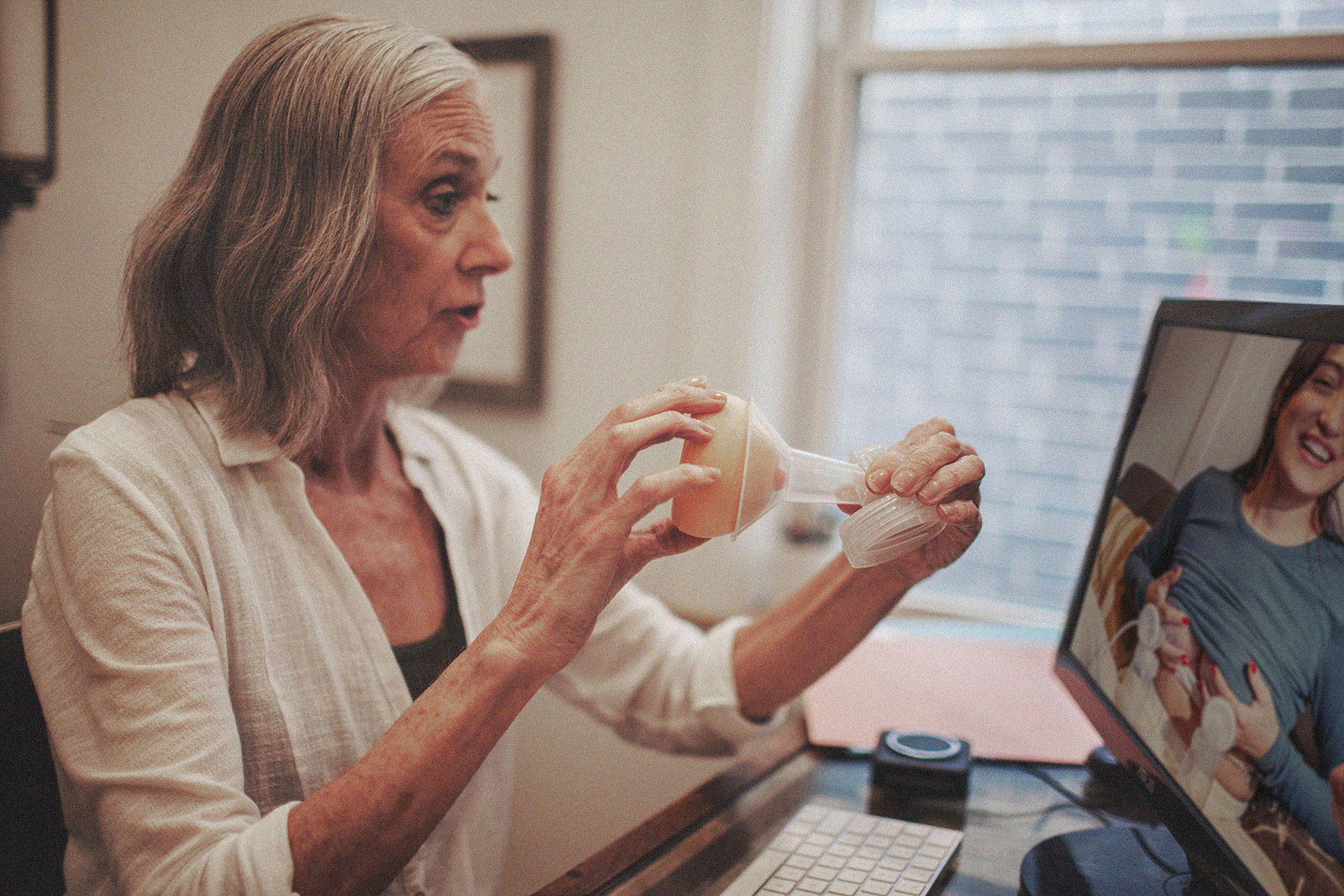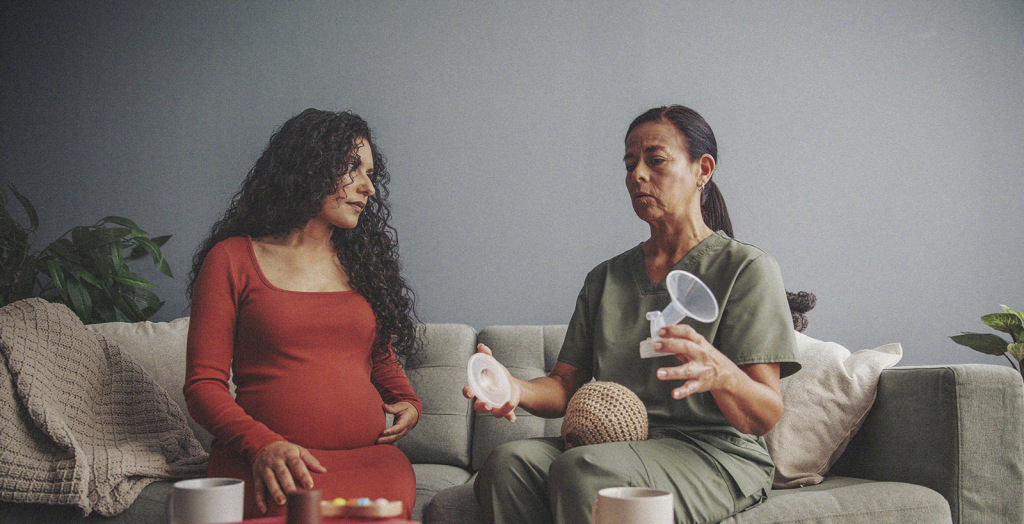How to become an IBCLC and help families thrive
A career as an International Board Certified Lactation Consultant (IBCLC) is both fulfilling and important: IBCLCs provide families with the expert, compassionate care they deserve. But how does one become an IBCLC and build a private practice? The Lactation Network’s Chrisie Rosenthal, IBCLC, discusses the role of an IBCLC, how they help families thrive, and the education and training it takes to become the highest-certified lactation consultant in the global community.
What is an IBCLC?
Let’s start with the basics: IBCLC stands for International Board Certified Lactation Consultant: The highest credentialed lactation expert with the only internationally recognized certification in the field of lactation. They possess highly specialized skills in breastfeeding assessment, care, and management, and are the only lactation consultants who can offer clinical care.
IBCLCs can help with all lactation needs, from latching and breastfeeding positions to finding the right pump and designing a workday pumping schedule. They are also able to address common lactation issues like plugged ducts, mastitis, milk supply, and breastfeeding pain.
In short, IBCLCs provide care from the prenatal period through weaning: One of the most vulnerable and critical times in the life of a parent and their baby.
CLC vs. IBCLC:
What’s the difference?
In your search for a career in lactation care or in considering a goal to build a private practice, other certifications may have caught your eye including Certified Lactation Counselor (CLC), Certified Lactation Counselor (CLC), Certified Lactation Specialist (CLS), Certified Lactation Educator (CLE), and Certified Breastfeeding Counselor (CBC). Though all of these professionals work in lactation, IBCLCs are markedly different.
Lactation training for most non-IBCLC roles is typically about 45 hours of classroom instruction, and is often a stepping stone on the way to fulfilling the IBCLC requirements. Those programs prepare graduates to provide lactation education and classes, but it’s not in their scope to provide the specialized clinical care required for lactation consultations.
In contrast, an International Board Certified Lactation Consultant or IBCLC is a healthcare professional and lactation expert holding the most comprehensive lactation certification and highest possible accreditation. It takes multiple years to become an IBCLC, 95 hours of lactation-specific education, and between 300 and 1,000 hands-on clinical hours. IBCLCs must also pass a strenuous IBCLC exam and be recertified every five years to maintain their certification.
How to become an IBCLC and build a private practice
Becoming an IBCLC is no easy feat. Rosenthal describes it as a long and arduous process, saying, “Most students take three to five years (or more) to complete the requirements and sit for the exam.”
Rosenthal recommends starting with the International Board of Lactation Consultant Examiners (IBLCE), the only credentialing organization for IBCLCs. The IBLCE hosts the IBCLC exam and provides resources and information for aspiring IBCLCs.
Many people become IBCLCs because they are passionate about lactation support. But in addition to your enthusiasm for the work, Rosenthal says, “You will also need to evaluate if you have the time, dedication, and financial resources to complete an IBCLC program.”
Without a doubt, the time and financial requirements it takes to become an IBCLC can be barriers — limiting the opportunities of people from underrepresented communities who want to work in lactation care. This, in turn, impacts access to lactation care in those same communities.
Research from the National Library of Medicine shows that strong ethnic/racial, socioeconomic, demographic, and geographic breastfeeding inequities persist in the United States. The lack of culturally sensitive lactation care leaves underrepresented communities even more isolated. “For that reason, it is extremely important that families have access to IBCLCs who reflect their community,” Rosenthal explains.
Hard work and dedication are crucial to becoming an IBCLC, but the payoff is worthwhile. “The relief families feel after a lactation consultation is often immediate. Observing the progress these families make and being a key support person helping them reach their feeding goals over time is incredibly rewarding,” says Rosenthal.
Deciding to become an IBCLC is the first step. Next up? Determining the pathway to certification.
The IBCLC certification pathways
There are three pathways to becoming an IBCLC, each made up of four components:
- Lactation Education
- Clinical Hours
- Health Science Education
- Exam
To take the exam, IBCLCs must also adhere to the Code of Professional Conduct for IBCLCs.
Though we’ll cover the basic requirements of each pathway, the IBLCE also provides this pathway decision map to help determine which is right for you.
IBCLC Pathway 1
Recognized health professionals and recognized breastfeeding support counselors
As a Pathway 1 candidate, you must complete:
- 1,000 hours of lactation-specific clinical practice within the five years immediately before your exam application
- If you are a peer supporter, your clinical hours must be supervised
- 95 hours’ worth of lactation-specific education within the five years immediately before your exam application
- Five of those hours must be focused on communication skills
- If you are a peer supporter, your lactation education must be supervised
- 14 subjects outlined in the Health Sciences Education Guide
IBCLC Pathway 2
Accredited lactation academic programs
In Pathway 2, you must complete a comprehensive university or college-based academic program in human lactation and breastfeeding. Your academic program must be accredited by the Commission on Accreditation of Allied Health Education Programs or another accrediting body with equivalent accreditation standards.
As a Pathway 2 candidate, you must complete the following requirements via your academic lactation program:
- 300 hours of directly supervised, lactation-specific clinical practice completed within the five years immediately before your exam application
- The supervising IBCLC must be currently certified and in good standing
- Much like Pathway 1, 95 hours of lactation-specific education completed within the five years immediately before your exam application
- Five of those hours must be focused on communication skills
IBCLC Pathway 3
Mentorship with an IBCLC
Pathway 3 applicants are mentored and supervised by an IBCLC, in accordance with the specifications in the Pathway 3 Plan Guide. Both the mentoring IBCLC’s certification status and your Pathway 3 Plan must be verified by the IBLCE before the beginning of the mentorship and earning clinical hours.
As a Pathway 3 candidate, you must complete:
- 500 hours of directly supervised lactation-specific clinical practice as described in the Pathway 3 Plan Guide within the five years immediately before your exam application
- As with Pathways 1 and 2, 95 hours of lactation-specific education within the five years immediately before your exam application
- Five of those hours must be focused on communication skills
- Health Sciences Education courses
The IBCLC exam
Once the requirements of a chosen pathway have been met, it’s test time! All pathways culminate in taking the IBCLC exam, offered twice a year in the spring and fall: March or April (in English) and September (in all IBLCE languages).
The exam comprises 175 multiple-choice questions, given in two parts. This typically takes four hours to complete, and exam results are available 10 to 12 weeks after the end of the exam window.
Now what?
After an aspiring IBCLC passes the IBCLC exam, they’re officially an International Board Certified Lactation Consultant! Now comes the best part: Helping families get the lactation care they deserve and building a private practice.
IBCLCs can work in several settings helping breastfeeding families, including hospitals and physician offices. However, “Many IBCLCs work in private practice within their communities,” Rosenthal says. “Private practice IBCLCs see patients in-home, in an office, or virtually via telehealth.”
But IBCLCs don’t need to exist on their own once they build a private practice. IBCLCs across the country find support and community with other lactation consultants at The Lactation Network. For IBCLCs who want financial security, agency, and support to build a private practice, grow, and amplify their businesses with true autonomy, The Lactation Network provides bespoke technology and end-to-end operations support to simplify IBCLC business needs and connect families to gold-standard lactation care.
“TLN connects families with IBCLCs for high-quality lactation support covered by their insurance,” says Rosenthal. TLN deals with insurance companies and billing so IBCLCs don’t have to, and supports IBCLCs private practices by offering marketing materials, tutorials, and webinars. Additionally, TLN has built proprietary tech tools and a custom portal to track patient care information. TLN empowers IBCLCs to be the best they can be.
But if becoming an IBCLC and working as a clinician in the lactation field isn’t a fit, that’s okay. Many other support roles exist in the breastfeeding community and are imperative to family thriving. “Become a breastfeeding ally,” says Rosenthal. “Advocate and vote for laws that promote breastfeeding rights and support breastfeeding families. Take steps locally to normalize public breastfeeding and further breastfeeding access. And support your friends and family who are breastfeeding.”
IBCLC or not, we can all do our part to advocate for the expert lactation care parents deserve and help families thrive.
We handle billing, end-to-end. We connect you with insurance-covered patients. We help you grow your practice, your way.




